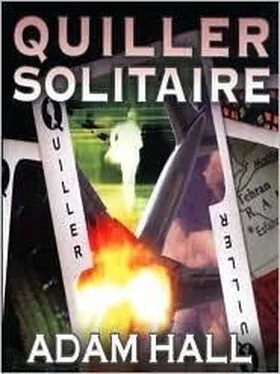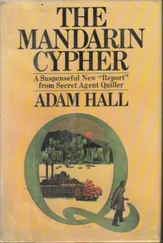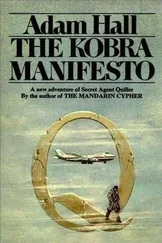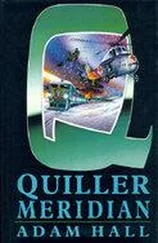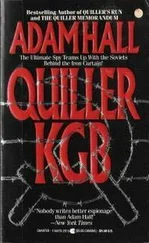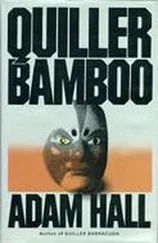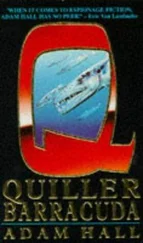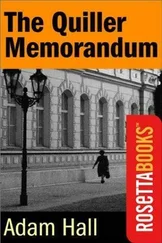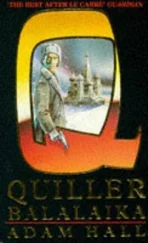Ibrahimi came through the archway at the far end of the courtyard. He wasn't a tall man but his robes gave him height arid a certain grace, and his black beard added a look of strength. I needed to know all I could about him in the little time left before the flashpoint. He would be going there with me, to receive the Miniver warhead.
'Helen,' I said, 'I'm going to give you a couple of designations. How's your memory?5 She opened her eyes at last and sat up, turning to look at me, the shoulder strap still hanging down, her eyes narrowed against the late sunlight. 'My memory's very good,' she said.
That too surprised me, and I felt a touch of admiration for her. That's the first time,' I told her, 'I've ever heard you say anything good about yourself. Do it again, get into the habit. It'll work wonders for you. Now listen, Klaus and George will be leaving you behind when they complete this operation of theirs, and back here the pressure will be off a little. If you can get away from here safely , take a taxi straight to the British Embassy and ask one of the staff there to pay the fare. They get a lot of tourists running out of money and trying to get home, so tell them this is prime ministerial business and ask them to put you on the line to the Foreign Office in London. Just keep on insisting. When you're through to the Foreign Office, ask for Liaison 5. If some new clerk says she doesn't know that department, tell her to get her boss on the line and keep on telling them you want Liaison 5. But you shouldn't have any trouble: Liaison 5 is known to all senior Foreign Office officials.'
It was the Bureau.
At the far end of the pool, Ibrahimi had begun talking earnestly to Klaus. He hadn't bowed when he'd gone up to him from the archway but it had been close. The German had total power over the members of his cell, whoever they were. He'd even killed an Arab and then told an Arab to get the 'mess' cleaned up – The mess, Ibrahimi, the mess!
When they put you through to Liaison 5, ask for Desk 19. You'll be given access right away.' Desk 19 was Holmes. 'The man at Desk 19 will recognise your name. Ask him to get you on a plane for London, priority. Now give me those designations.'
'Liaison 5, then Desk 19.'
I got out of the chair and looked down at her. 'Go into the palace as soon as you can and write them down, keep them hidden away. However good our memory is, we can forget the most vital things in a crisis.' She watched me with that stillness of hers, her eyes attentive, and I would have liked to stay talking to her, would like to think that one day, one fine day beyond the dark and ominous horizons of Midnight One, I might pick up a telephone and dial the number in Reigate and ask her if she'd like me to go round there for a cup of tea. That would be nice. 'Don't take any risks,' I said in a moment. Wait for the right chance. And after all this is over for you, tell yourself again that you have a very good memory, just as you told me. And tell yourself all the other things your father's chosen to ignore, that despite his attempted sabotage you've managed to grow into a beautiful woman, poised and gracious and quite stunningly attractive. It's time to understand that now.'
I turned away and left her, going across to a chair nearer the deep end of the pool, taking my time, talking to one of the servants who'd come back to stand near the walls, asking him where I could buy the best souvenirs among the souks. I was close enough to the group now – Klaus, Geissler and Ibrabimi – to hear snatches of French. It was the second language here and Ibrahimi was fluent; the two Germans were less at home with it.
I'd told Klaus we needed a name for when the delivery of the Miniver was made, and he'd given me one. When your people approach at that time, one of the men in the car will get out and meet them. His name is Muhammad Ibrahimi.
He would be there with me at the flashpoint, and what would happen, the way things would go, would depend critically on what kind of man he was and what I could do with him, if I could do anything with him at all.
Sand gritted softly under sandals, and two more Arabs came into the courtyard in plain white kaftans. Klaus went across to them straight away, and they greeted one another in the Moslem fashion, which I hadn't seen the German do before: so far he hadn't shown too much respect for Arabs. Then I recognised one of them. He was Khatami, the Iranian pilot: I hadn't seen him in native dress before. Perhaps they'd arrived in the car I'd heard just now. He said he was going to the mosque , Helen had told me. Klaus spoke to them for a few moments in his halting French; I caught only a word or two but it sounded like an exchange of courtesies, or it could have been more than that: he was asking them how they felt, rather than how they were – Comment vous sentez-vous and not the formal Comment allez-vous . I thought this was interesting, because nothing had happened to them as far as I could see. But Klaus wasn't necessarily asking them how they felt now – after something had happened – but how they were feeling at this time when something was going to happen, as when we ask an athlete how he's feeling before a race. I played with it in my mind because I thought it was important, and might offer a clue; but I was desperate now for clues as we neared the flashpoint and it could have been simply that I was reading too much into things.
Klaus left them, touching their arms in a gesture almost of affection, and clapped his hands for servants. Two of them brought bowls and small muslin towels, and as the pilot and his friend – copilot? – sat at their ease below the leaves of an olive tree the boys knelt in front of them, bathing their feet with an air of ceremony; other servants brought fruit and a bottle of Vichy water and pewter cups. None of the Europeans here took any notice, but the Arabs – Muhammad Ibrahimi and the servants – seemed interested, glancing across now and then. The pilot, Khatami, had the same look of quiet exaltation I'd noticed on the plane, and so did his friend.
I made another routine check around the environment in case there was anything to be picked up. Klaus wasn't talking to Ibrahimi any more: I assumed the Arab had come to report on what he'd been doing to keep the dead boy's family quiet -they would have been told to say his body had been found somewhere else, victim of an unknown assassin, something like that. Klaus would get away with it if the truth came out – he had a perfect case for a plea of self-defence in front of witnesses – but he was a busy man: today he'd killed only a dog and an Arab boy, but there were more deaths than that on his agenda, perhaps hundreds, on the stroke of Midnight One.
He was sitting alone now, leaning forward with his big hands interlaced, his eyes on the surface of the pool where the scimitar leaves of the eucalyptus floated, his mind absent, his fingers sliding together, sliding away, his whole body arched, flexed like a bow: he was in a form of meditation, deep in the theta waves, close to trance.
Inge Stoph watched him, her bright eyes idolatrous. Geissler was talking in low tones to Ibrahimi. The guards weren't moving, weren't bouncing cockily on the balls of their feet any more: they'd been tested and found wanting, and I suppose would be fired and replaced, fired or left somewhere humped on the ground with an arm thrown out in mute testimony to their fuhrer 's displeasure – I'd seen today that in this small sovereignty of terror Dieter Klaus considered himself and was considered to be omnipotent, with the status of a god and the rights of a god over life and death. It was the only way he could run this show, the only way he could live.
Dolores had gone into the building after the scene with the Arab boy, and hadn't come out. Helen was lying down again, flat on her back, a sheen on her white face; I think she'd have liked to go into the palace too, or anywhere away from Dieter Klaus, but was afraid that if she stood up and tried walking she might feel dizzy and be sick.
Читать дальше
